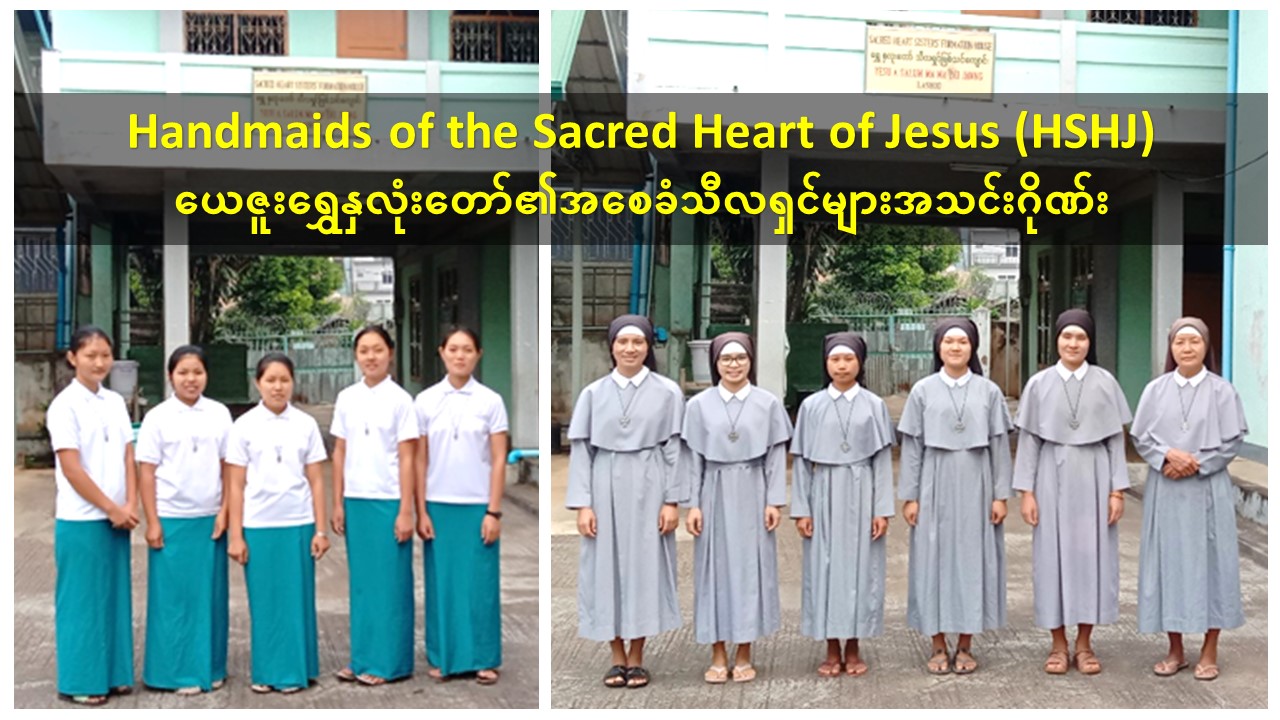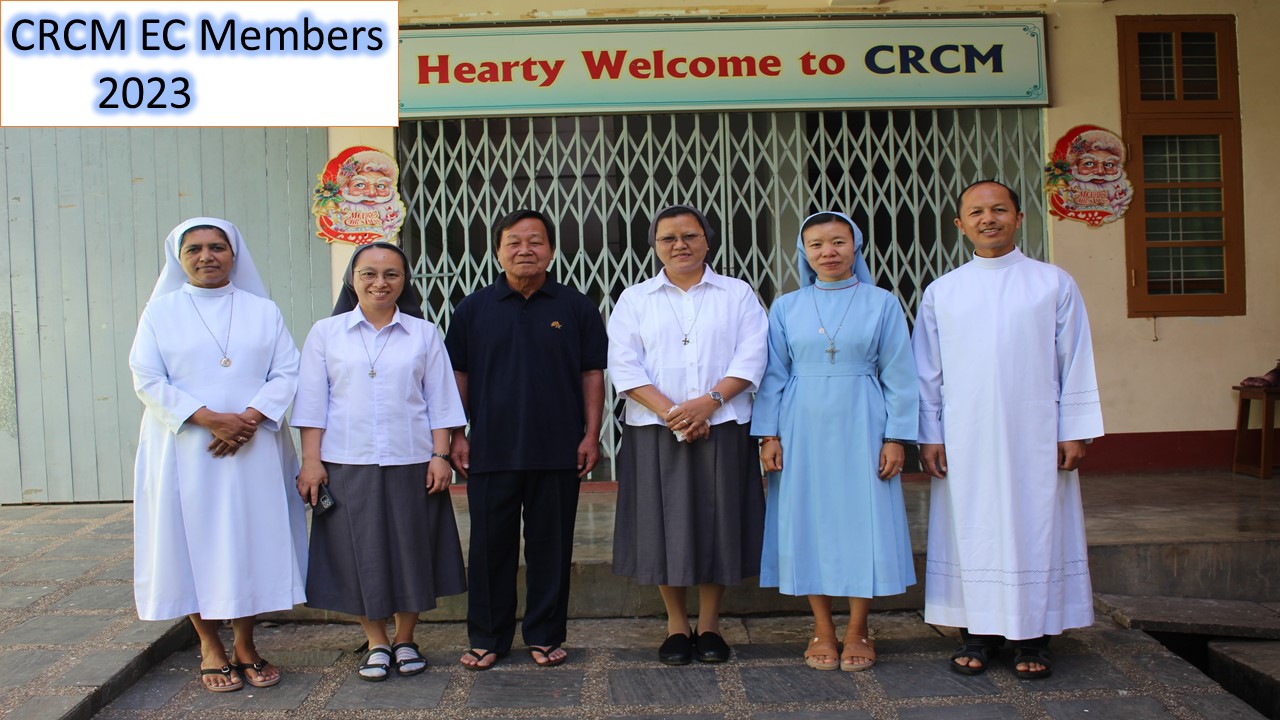

APOSTOLIC SOCIETY OF THE MOST SACRED HEART OF JESUS (SSHJ)
Lashio, Diocese of Lashio
The Apostolic Society of the Sacred Heart of Jesus (for women) was founded by Bishop Philip Lasap Za Hawng, the Ordinary of the diocese of Lashio in collaboration with Sr. Maria Phug’ Yaug Cao: Nao” as supported by the diocesan priests.
The rationale of the Founding of the Society: The diocese of Lashio is the home of many races and ethnic groups. Shan, Ta-ang (Palaung), Kachin, Wa, Lisu, Lahu, Miao (Mong), Chinese are the main races living in Northern Shan State which forms the diocese of Lashio. Each of these races is divided into a few different tribes with distinct languages or dialects though other aspects of cultures among the tribes of each race are mainly the same. In towns, there are some Burmans and Indians too. Christians are found among the minority races and tribes of Kachin, Lisu, Wa, Lahu, Miao and Shan. Majority of these people live in rural areas and they do not know fluently the Burmese language which is the national or official language. In rural parishes where the faithful are people of ethnic tribes, preaching of the Gospel, religious instructions and liturgical celebrations need to be done in their respective languages or dialects if the work of evangelization is to be more effective, sinking in their hearts. Many of us - priests and religious are limited only to the use of Burmese in their pastoral instructions. Majority of the religious personnel serving in the diocese come from other parts of the country and they find it very hard or not interested to learn the languages of the place to where they are assigned. This lack of interest in local language and customs is strongly felt by the people in many places, especially when the community is surrounded by the majority Baptist Christians who emphasize the use of local language as they usually form local Churches according to races or language groups. Thus, they are better looked upon as the Church that concerns herself more with the interests and welfare of her people. They promote the literature of the local people by regularly conducting weekend or at least summer classes for ethnic peoples’ literature on how to read and write; they promote it by using it widespread in preaching, instructions and in community worship. With these experiences and feelings at heart, the diocese would like to promote local vocations for the apostolic life by founding the Society of the Sacred Heart of Jesus which will later become a religious congregation of Diocesan Right. The society will make a great effort in contextualizing the gospel message.
Looking also from the purely social aspect of human development and culture, every language and customs/culture has some particular social or human values to contribute to humankind. We can be sure that some such values have disappeared and will continue to vanish from the face of the earth if a language and customs of an ethnic tribe are not promoted with some balance or at least helped to preserve it. Today, many such values are going away as many minority races and tribes are being slowly dominated by the majority or more ‘developed’ languages with many written materials and being used in modern technology of communications. This is another aspect of ‘globalization’. As a bishop, I feel that the Church should try her utmost best to help the minorities preserve their languages and customs with their good socio-human values. In every custom or culture, there may be some undesirable elements for human development or for our life of Christian faith. Such elements are surely to be avoided or corrected.
Vision of the Apostolic Society of the Sacred Heart of Jesus:
A Society of women who are dedicated to God by a life of prayers and unity while serving God’s people to be healthy and educated and leading them to know and love God and one another.
Mission of the Apostolic Society of the sacred Heart of Jesus:
1) To live a life of dedication to God by prayers and unity
2) To study/learn main local languages and cultures and promote them by using them in evangelization
3) To teach catechism/give religious instructions
4) To educate the poor
5) To help the sick
1. Name and Nature of the Apostolic Society:
a) The name of the Society is the “Apostolic Society of the Most Sacred Heart of Jesus.”
b) It is a society of apostolic life dedicated to God for personal sanctification and for the evangelization of peoples and it is under the special care and guidance of the Bishop of Lashio and his successors. The society is destined to become a religious congregation of ‘Diocesan Rights.’
c) The members of the Apostolic Society of the Most Sacred Heart of Jesus profess the three evangelical counsels with simple vows of chastity, poverty, and obedience which may be temporal or perpetual.
2. Aim and Objective of the Apostolic Society:
The aim and objective of the Apostolic Society of the Most Sacred Heart of Jesus is ‘the greater glory of God and sanctification of its members’ by the profession of the three evangelical counsels and the practice of the regulations prescribed in the statutes of the society.
3. Apostolate of the Society:
In order to extend the Kingdom of God the members will take up the mandates of the Diocesan Bishop, namely, the educational and health-care works, the care of the orphans, and the teaching catechism in preparation for the fruitful reception of the Sacraments. The members will take special interests and make efforts to learn the local languages and customs and promote them by using them in apostolate and, when needed, serve as teachers to teach the youngsters the literature of their language or dialect.
4. The Charism of the Society:
The charism of the society is “Active Participation in the Diocesan works of Salvation and in the integral development of the people” after the example of Mary, the Mother of God who whole heartedly and humbly participated in the salvific mission of her Divine Son Jesus Christ.
5. The patroness of the Society:
Mary, Mother of God and Mother of good counsel and Mother of God.
6. The example and model of the members:
St.Paul, the Apostle of the Gentiles; St. Francis of Asisi; St. Francis Xavier; St. Theresa of Avila, St. Margaret Alocoquet, St. Columban and St. Philomena.
7. The motto of the Society:
‘’...Learn from me for I am gentle and humble of heart: and you will find rest.’’ (Mt. 11: 28)
Initial Formation
1. Aspirants
2. Pre-novitiate (Postulancy) (one year)
3. Novitiate (two years)
4. Temporary profession (5 years to 9 years)
5. Perpetual Profession
Address; Sacred Heart Formation House
San Kaung Road, Block (2), Lashio.





 for web4.jpg)
 for web3a.jpg)


